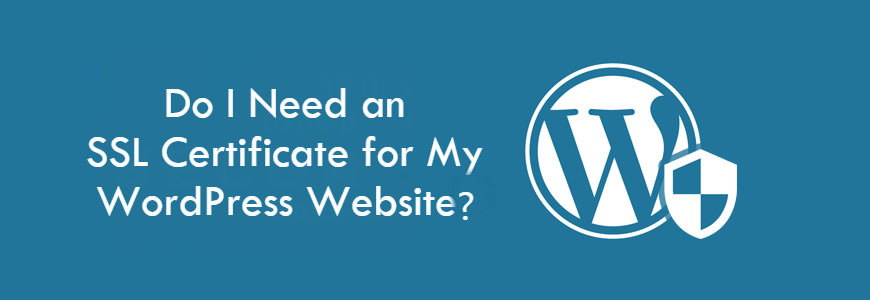I have a WordPress site; do I need an SSL certificate? Let’s find out
Do you have a WordPress website? Are you wondering whether you need an SSL certificate or not? Well, you couldn’t have landed on a better page. In this post, we’ll try to answer all the questions about SSL for WordPress that you have to leave you in peace.
First, let’s understand what an SSL/TLS certificate is, and what it does.
So, what is an SSL certificate?
‘SSL certificate’ doesn’t sound like a website security solution, but you know what? It is. While browsing on the internet, you’d have noticed two things – HTTP & HTTPS. You don’t have to be the most attentive person in the world to see it.
HTTP is an internet protocol used for communication over the internet; the same way HTTPS is. The difference –as you can see—lies in the ‘S.’ This ‘S’ stands for secure. So when the communication takes place through HTTPS, the information is secured through encryption.
So how do you get HTTPS? Yes, you guessed it right—you get an SSL certificate.
SSL stands for ‘Secure Socket Layer,’ and it’s a cryptographic protocol used for encrypting data-in-transit. It’s the technology lying underneath an SSL certificate. Note that SSL is the predecessor of the protocol used currently—TLS (Transport Layer Security).
So shouldn’t we be calling them TLS certificates? Well, we should be. However, the term ‘SSL certificate’ is used extensively because we’ve gotten used to that term. However, the technology/protocol behind an SSL certificate is TLS.

What does an SSL certificate do?
An SSL certificate has two primary functions—encryption and authentication. Let’s talk about the former first.
When you’re using a website, your system (PC/Tablet/Mobile) communicates with the server of that website. What if a hacker establishes him/herself in between and intercepts and alters the data to his/her advantage? What if this data is your credit card information? S/he could cause havoc. To keep the data away from the reaches of ill-intended entities, an SSL/TLS certificate encrypts the data and turns it into an unreadable format. In such a precarious world of internet, this is of paramount importance.
Now let’s talk about the authentication part.
Suppose there’s a site named xyz.com which claims to be belonging to XYZ corporation. But how do you make sure that it’s XYZ that’s running the website xyz.com? What if XYZ doesn’t have a site and a fraudster has created the website to dupe users into giving their sensitive details? Such attacks are indeed a possibility. SSL/TLS certs help immensely against such attacks.
To obtain a high assurance SSL certificate—recommended for businesses, organizations and e-commerce sites—one must go through an intense vetting process conducted by a certificate authority. The certificate is issued only and only if one passes through the process. This way, it’s made sure that only the genuine entities get hold of SSL/TLS certificates and no skimmer can fool users.
SSL seems good, but do I need it?
Absolutely.
There are a hundred reasons for installing an SSL certificate, but today, we’re going to focus on five.
Let’s go back a bit. In 2014, Google, with the ambition to encrypt all of the internets, announced that HTTPS would be a ranking signal. This was Google’s one of the very first moves to achieving its campaign ‘HTTPS everywhere.’
If you have a text input field (email id, passwords, credit card info, etc.) in your WordPress site, there is a risk of a man-in-the-middle attack. So if you don’t want your users’ sensible details to be compromised, you must install an SSL certificate for encryption.
If you have a business or organization and want to show prove your identity to the users, there is no better way to do so than to flaunt your organization name in the address bar. This results in enhanced customer trust and improves brand recognition.
It might be possible that you and your WordPress site have nothing to do with Google rankings, or brand recognition or even user security. However, there’s one reason that you should care about is browser warnings. Google Chrome, the most popular browser on the planet, now marks all HTTP websites as ‘Not Secure.’ Such a warning could turn out to be deadly from the site reputation and popularity point of views. Nobody would want to scare their visitors away by such warnings. We assume you believe the same.
Conclusion
Do you need an SSL certificate for your WordPress website? Here are the answers:
- Yes, if you care about your Google rankings.
- Yes, if you care about the security of your users.
- Yes, if you don’t want your site to be marked as ‘Not Secure’ in Google Chrome.
- Yes, if you want to increase user trust by showing your identity.
- Yes, if you want your website to be PCI compliant.
- No, if you believe in ‘ignorance is bliss.’







